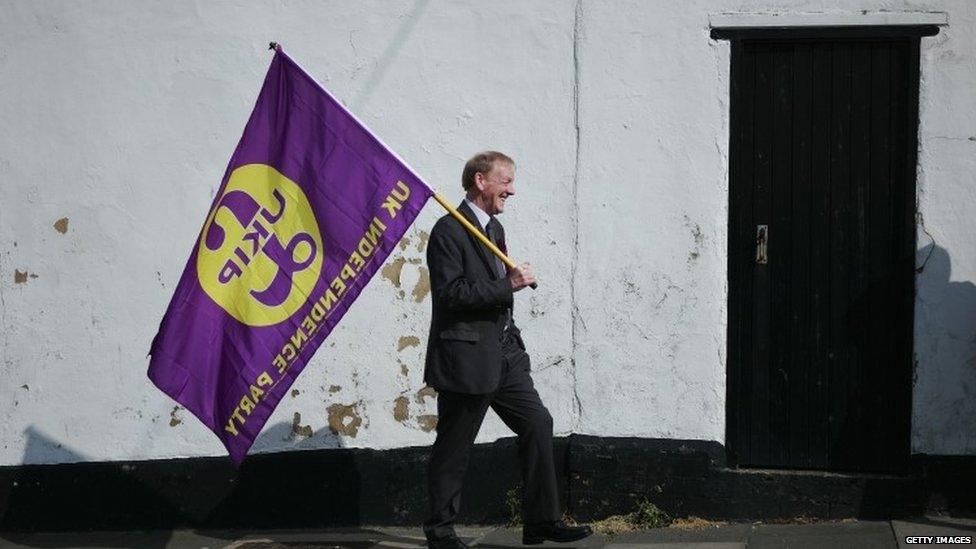Local elections: UKIP suffers big losses across England
- Published
- comments

UKIP has lost a swathe of council seats in England and Wales, leading to claims that the party is in crisis ahead of June's general election.
In total, UKIP lost 145 councillors and secured one seat.
It was wiped out in Lincolnshire, losing 13 seats, while all its nine representatives in Essex were defeated.
Independent MEP Steven Woolfe said UKIP's influence was now "at an end" but party leader Paul Nuttall said it was a "victim of its own success".
Mr Woolfe, who quit the party last year after an internal dispute, told BBC Radio 5 live that if the choice at next month's general election was between Conservative leader Theresa May and UKIP leader Paul Nuttall he would "have to vote for Theresa May".
Former MP Douglas Carswell and UKIP donor Arron Banks also cast doubt on the future of the party while elections expert John Curtice said UKIP, which won 3.8 million votes at the 2015 general election, had lost "everything they've been trying to defend".
It did win one seat from Labour on Lancashire County Council. Alan Hosker won in Padiham and Burnley West, a ward represented by the BNP between 2009 and 2013.
UKIP's losses come just weeks before a general election in which the Conservatives are hoping to squeeze their vote.
Sorry, your browser cannot display this map
In Lincolnshire, where Mr Nuttall is standing in the general election in Boston and Skegness, UKIP went from being the official opposition to having no seats at all as the Tories gained 23 seats.
It also lost eight seats in Hampshire, two seats on the Isle of Wight and eight in East Sussex. However, senior UKIP figures sought to put a brave face on the performance.

Analysis
By political correspondent Ben Wright
The "people's army" has deserted its leaders. After years building its strength in local government, UKIP seems to be collapsing as its former supporters abandon the party for the Conservatives.
UKIP lost all its seats in Hampshire, Essex and Lincolnshire. The east coast county was once a purple bastion and is where Paul Nuttall will try and win a parliamentary seat. The party's failure there encapsulates its demise.
Will UKIP do better at the general election? Possibly. But these results mirror its slide in recent opinion polls. It now has no MPs, and when Britain leaves the EU it will lose all its MEPs too. The future for UKIP looks bleak.
And of course it's easy to see why. The party's core purpose was to campaign for Britain to leave the EU. Now Brexit is happening, UKIP voters are walking away.
But what is significant is how they are turning to the Tories in huge numbers.
For more than a decade the eurosceptic right of British politics has been fractured. David Cameron saw UKIP eating into the Tory vote and promised an EU referendum to try to halt the march.
Labour too lost many of its traditional working-class supporters to UKIP. But by embracing Brexit and squaring up to Brussels, it's Theresa May's Conservative Party reaping the reward.

Mr Nuttall said it had been a "difficult night" but there was little the party could have done in the face of a "big national swing" to the Conservatives.
"Mrs May's public dispute with the EU in recent days - which led to her speaking about standing up to Brussels in an eve-of-poll statement in Downing Street - was particularly fortuitously timed for the Conservatives," he said.
"If the price of Britain leaving the EU is a Tory advance after taking up this patriotic cause, then it is a price UKIP is prepared to pay.
"We are the victims of our own success and now we pick ourselves up and go on to further success in the future."
'Flying UKIP flag'
UKIP's local government spokesman Peter Reeve maintained the party was still "leading the national agenda".
He told the BBC: "We are never happy when we are not winning seats - and today hasn't been good on that front.
"The reality is... the Conservative Party have painted themselves in UKIP colours, flying a UKIP flag, and the danger is they won't fulfil the promises and pledges they have now made.
"UKIP will have a resurgence when Theresa May's promises start to unravel."
Conservative defence secretary Michael Fallon said his party appeared to be picking up votes from UKIP and other parties, but he cautioned that this did not mean this would be case on 8 June.
Sorry, your browser cannot display this map

